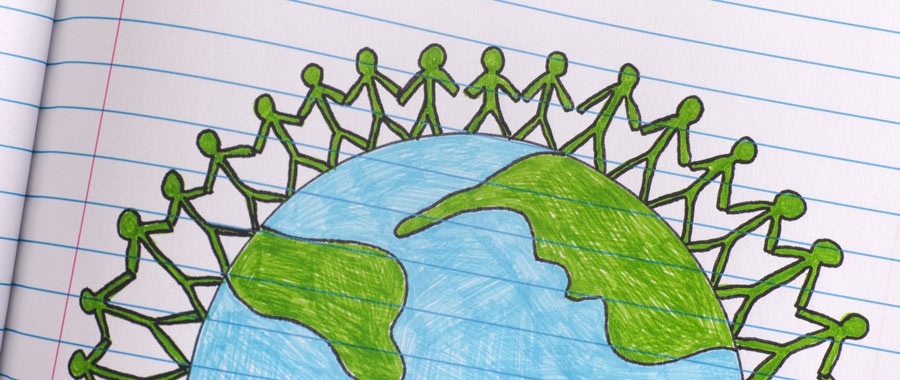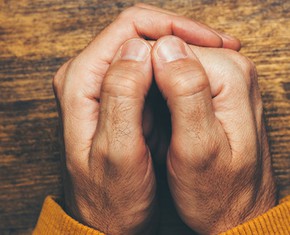The views expressed in our content reflect individual perspectives and do not represent the authoritative views of the Baha'i Faith.
In this time of social distancing, with people learning to forego handshakes and hugs, we might easily conclude that human unity has potentially infectious consequences of the worst kind.
But human unity, in its most profound sense, goes far beyond physical touch – it extends into the deepest spiritual fabric of our societies:
… consider how the cause of the welfare, happiness, joy and comfort of humankind are amity and union, whereas dissension and discord are most conducive to hardship, humiliation, agitation and failure. – Abdu’l-Baha, Selections from the Writings of Abdu’l-Baha
In fact, the hardship and agitation produced by this coronavirus pandemic can potentially teach us a great deal about unity, solidarity and social cohesion.
Long before the emergence of the coronavirus, our cultures suffered from enormous disunity. We separate ourselves by economic class, by the colors of our skin, by religion, by nationality, by political affiliation and even by trivial matters of taste and preference. In the West, our predilection for stark individualism separates us further. Dissension and discord alienate us on social media and in the shared cultural commons.
“But unity… has a powerful advantage, especially in cases of calamity.”
All of this disunity has powerfully affected the institutions in our societies that used to provide us with a sense of belonging. Churches, social clubs, civic associations, unions – all have declined dramatically in membership. The village-oriented small town mentality that used to characterize much of the world’s social and economic life has changed profoundly as the majority of the world’s population migrated to urban centers, where it is much harder to be known as an individual. Huge multinational corporations dominate, which tends to push smaller businesses into obsolescence. The cult of celebrity further separates those privileged with great fame and wealth from the masses who adore them and cast them as role models. The illusion of individuality creates a thin veneer of civility, but underneath lurks an atomized individual without connection or kinship to the rest of human society.
As a result of all this, or perhaps as a consequence of it, our sense of human solidarity and unity has deeply diminished.
But unity – as anyone who has ever lived in a small village will tell you – has a powerful advantage, especially in cases of calamity. When disaster strikes, people need each other. None of us can survive on our own, especially in this technological era. Every one of us, without exception, has to make an active commitment to the common good, to loving the whole of humanity. Dealing with calamity requires amity.
The coronavirus pandemic, then, has presented humanity as a whole with a tremendous, immediate and deadly challenge, the likes of which we’ve never seen before. It has given us something too valuable to waste: a common enemy we have to fight and defeat together. Here’s how one surgeon on the front lines of dealing with the pandemic put it:
We are living in a global public health crisis moving at a speed and scale never witnessed by living generations. The cracks in our medical and financial systems are being splayed open like a gashing wound. No matter how this plays out, life will forever look a little different for all of us. – Dr. Cornelia Griggs, New York Times, 19 March 2020.
That’s the upside of a crisis: that “life will forever look a little different for all of us.” So, now that we’re fighting a common enemy together, how should life look different? When the pandemic has died down, or our scientists and physicians have found a vaccine, will we go back to the same old fragmented, disunified society, or will we recognize the benefits of unity and act to extend them to everyone?
Think back to the global crises you’ve lived through – wars, massive terrorist attacks, pandemics and other catastrophes. Remember how you felt when the crisis began to abate? You likely had a sense of relief and gratitude that you and your loved ones survived, that the world once again felt stable and secure. Most importantly, you felt a sense of unity and solidarity with others. Together, you had all united and worked together amicably and come through a perilous period with each other; you had all pulled in the same direction to help; and you were helped by others, too. That’s called amity, solidarity, cooperation and unity – the active realization that we depend on one another, every day, for our very survival and much more.
From a Baha’i perspective, these severe worldwide tests and difficulties have a purpose – to further weld us together as one human family:
As you will be all too aware, over recent weeks and months, an apprehensive world has been coming to terms with a rapidly evolving health crisis affecting the people in many countries, the consequences of which for society cannot yet be estimated with any certainty. We are sure that you, like us, have felt great concern for the well-being of humanity, especially for those who are most vulnerable. Seldom has it been more evident that society’s collective strength is dependent on the unity it can manifest in action, from the international stage to the grassroots, and we know that you are giving your support to the essential efforts being made in this regard to protect the health and welfare of all. …
However difficult matters are at present, and however close to the limits of their endurance some sections of societies are brought, humanity will ultimately pass through this ordeal, and it will emerge on the other side with greater insight and with a deeper appreciation of its inherent oneness and interdependence. – The Universal House of Justice, To the Baha’is of the World, 19 March 2020.
“Society’s collective strength,” the Universal House of Justice wrote, depends “on the unity it can manifest in action, from the international stage to the grassroots …” As Baha’u’llah wrote:
The fundamental purpose animating the Faith of God and His Religion is to safeguard the interests and promote the unity of the human race, and to foster the spirit of love and fellowship amongst men. – Tablets of Baha’u’llah
This basic fact, so prominent in the Baha’i teachings, has profound implications for how we deal with the coronavirus pandemic. Can the entire world manifest unity in action against a common viral foe? Do we have each other’s backs, and lungs? Could our collective response to the first truly global enemy of the entire human race cause us to jettison the old animosities, hatreds and prejudices that divide and dis-unify us? Might we just, as the Universal House of Justice suggests, “emerge on the other side with greater insight and with a deeper appreciation of [our] inherent oneness and interdependence.”?
















Comments
Sign in or create an account
Continue with Googleor